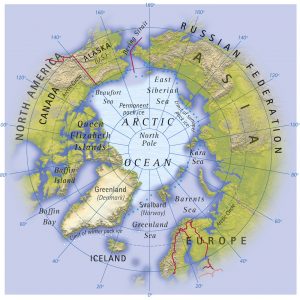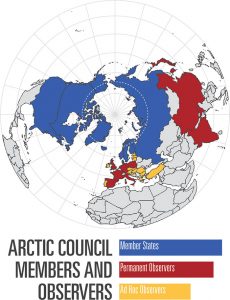Solving contentious challenges in the Arctic necessitates collaboration amongst key stakeholders.
We conducted four case studies in the area of international cooperation and security:
- Russia and NATO militarization
- China and Militarization in the Arctic
- Non-Indigenous Whaling
- the North Atlantic mackerel fishery
The four case studies detailed under the “Issues & Policy Ideas” tab demonstrate the importance of the participation and engagement of all relevant stakeholders in contentious Arctic issues. The lessons gleaned from these case studies can be applied globally, even beyond the Arctic.
Overarching questions of Arctic cooperation and security:
- How do global power dynamics affect the Arctic region?
- How do regional conflicts in the Arctic affect global governance and flows of topology?
- How do we address growing competition over increasingly accessible natural resources?
- How do we encourage cooperation between Arctic actors with very different interests?
- How do we ensure that key Arctic actors do not feel/are not excluded in decision-making processes?
- How do we keep peace in the Arctic?
Diversity, breadth, and relevance of our case studies:
The case studies we present on this website cover diverse topics. However, militarization in the Arctic by Russia, NATO, the US, and China are all closely linked to one another because each actor is responding to the actions of other Arctic actors.
The regulation of non-indigenous whaling and of the North Atlantic mackerel fishery also share common themes and obstacles with each other. In both case studies, Arctic actors have struggled to find common ground in terms of fisheries management.
Issues regarding fisheries and militarization may seem unrelated, but they are linked through shared challenges of cooperation and inclusion.
It should be noted, too, that some of our case studies have broader impacts on Arctic politics than others. For example, militarization generally has a greater effect on people’s lives and is assigned a higher degree of urgency in international political discourses. For this reason, discussions of security issues can sometimes overpower discussions of other challenges of great importance.
Important background information:

“The Arctic Council is the leading intergovernmental forum promoting cooperation, coordination and interaction among the Arctic States, Arctic Indigenous peoples and other Arctic inhabitants on common Arctic issues, in particular on issues of sustainable development and environmental protection in the Arctic.” (Arctic Council 2021).
Per the Arctic Council’s founding document, the 1996 Ottawa Declaration, the Council cannot engage with issues of military security.
The Arctic Council is composed of a central voting body made up of the Member States – Canada, the Kingdom of Denmark (Greenland and the Faroe Islands), Finland, Iceland, Norway, Sweden, the Russian Federation, and the United States.
Included as non-voting members of this central body are organizations representing Arctic Indigenous peoples called Permanent Participants – Aleut International Association, Arctic Athabaskan Council, Gwich’in Council International, Inuit Circumpolar Council, Russian Association of Indigenous Peoples of the North, Saami Council
Lastly, the Arctic Council includes Observer States, NGO’s, intergovernmental organizations, and interparliamentary organizations who operate through the working groups to conduct research and create proposals for new protocols and guidelines. Observer states include France, Germany, Italy, Japan, the Netherlands, People’s Republic of China, Poland, Republic of India, Republic of Korea, Republic of Singapore, Spain, Switzerland, and the United Kingdom.

Defining the Arctic:
The Arctic has many geographic definitions—such as the Arctic Circle, the tree line, or the 10 degrees Celsius isotherm (Hough 2013, 2-6). But in today’s increasingly globalized world, this definition of the Arctic is no longer sufficiently inclusive to facilitate effective regional governance. There are now relevant Arctic actors without an Arctic border that must have a say in Arctic governance.
International Relations vocabulary:
Militarization: The continual buildup of military infrastructure, personnel, and operations in a region.
Cooperation: Actors working together toward a common goal.
International Security: Military and diplomatic measures that nations and international organizations such as the United Nations and NATO take to ensure mutual safety and security (RAND Corporation 2021).
To understand more about challenges surrounding international cooperation and security in the Arctic, see the case studies under the “Issues & Policy Section.”